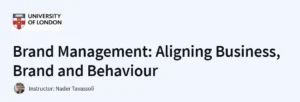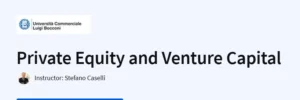What you will learn in Risk Management Specialization Course
Understand the concepts and principles of credit risk management and the steps to manage portfolio credit risks.
Use statistical models to measure risk associated with different types of investments.
Learn how to build an operational risk assessment program.
Program Overview
Credit Risk Management
⏳ 12 hours
- Understand credit risk types, measurement tools, and frameworks for managing credit risk in financial institutions.
Market Risk Management
⏳ 15 hours
- Learn about risk in trading and investment portfolios, including value at risk (VaR) and stress testing.
Operational Risk Management
⏳ 10 hours
- Develop skills to assess and manage operational risks, with an emphasis on identification, mitigation, and measurement of these risks.
Risk Management Framework and Applications
⏳ 13 hours
- Apply risk management strategies to real-world scenarios, integrating knowledge from the previous courses.
Get certificate
Job Outlook
Enhances mathematical proficiency for careers in engineering, data science, and computational modeling.
Provides a solid foundation for advanced studies in mathematical theory and analysis.
Completing this course can bolster qualifications for roles requiring strong analytical and problem-solving skills.
Specification: Risk Management Specialization
|
FAQs
- No, you don’t need an advanced finance or auditing background to enroll.
- The specialization begins with fundamental concepts like identifying risks and understanding their impact.
- Complex areas such as quantitative analysis are explained step by step with practical examples.
- It’s suitable for students, early professionals, and managers who want structured knowledge.
- A basic understanding of business operations can be helpful but is not mandatory.
- The course covers financial risks, such as market fluctuations and credit exposure.
- Operational risks like system failures, human error, or supply chain issues are also included.
- Strategic risks, including poor planning or competitive threats, are analyzed.
- Compliance and regulatory risks are studied to prepare for governance standards.
- The mix ensures you gain a well-rounded understanding of enterprise-wide risk management.
- The specialization integrates case studies drawn from real organizations.
- You’ll practice using risk matrices, assessment templates, and frameworks.
- Assignments require you to evaluate risks and propose mitigation strategies.
- Simulated decision-making exercises help you think like a risk manager.
- By the end, you’ll know how to apply these tools directly in your workplace.
- The specialization prepares you for roles such as risk analyst, compliance officer, auditor, or project manager.
- Organizations value employees who can identify and manage uncertainty.
- Skills gained—like communication, risk reporting, and decision-making—help you stand out in leadership roles.
- It also builds a foundation for advanced certifications like FRM, PMP, or ERM.
- Completing this course signals to employers your ability to handle critical responsibilities.
- Yes, risk management principles apply in all industries.
- In finance, you’ll understand credit and market risk.
- In healthcare, you can apply concepts to compliance and patient safety.
- In technology, lessons help address cybersecurity and system risks.
- In manufacturing and supply chains, you’ll analyze operational and strategic risks.
- The versatility ensures you can adapt these skills to whichever sector you pursue.





